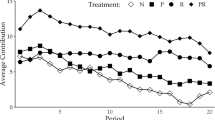Abstract
Male juvenile offenders were asked to evaluate the work of an experimental partner (confederate) who completed a work task four times. The work partner cheated on two trials and did not cheat on two trials while working for a charity (one cheat and one noncheat trial) or for selfish gain (one cheat and one noncheat trial). It was found that subjects rated the work done on cheating trials lower than work done on noncheating trials. In addition, subjects shared less reward money on cheating trials relative to noncheating trials. However, the intentions of the confederate, defined as the reward recipient, failed to affect subjects' judgments. These results were described as supporting previous studies which have indicated that delinquents fail to take account of others' intentions when making moral judgments.
Similar content being viewed by others
References
Bandura, A., & McDonald, F. J. Influence of social reinforcements and the behavior of models in shaping children's moral judgments.Journal of Abnormal Psychology, 1963,67, 279–281.
Cowan, P. A., Langer, J., Heavencick, J., & Nathason, M. Social learning and Piaget's cognitive theory of moral development.Journal of Personality and Social Psychology, 1969,11, 261–274.
Garrett, J., & Libby, W. L. Intention and chance reward allocations in the dyad as determinants of equity.Journal of Personality and Social Psychology, 1973,28, 21–27.
Heisler, G. Ways to deter law violators: Effects of levels of threat and vicarious punishment on cheating.Journal of Consulting and Clinical Psychology, 1974,42, 577–582.
Hill, G. Cheating among delinquent boys.Journal of Juvenile Research, 1934,18, 169–174.
Hudgins, W., & Prentice, N. M. Moral judgments in delinquents and nondelinquent adolescents and their mothers.Journal of Abnormal Psychology, 1973,82, 145–152.
Kohlberg, L.The development of modes of moral thinking and choice in the years 10 to 15. Unpublished doctoral dissertation, University of Chicago, 1958.
McCann, D. C., & Prentice, N. M. The facilitating effects of money and moral set on the moral judgment of adolescent delinquents.Journal of Abnormal Psychology, 1973,82, 81–84.
Piaget, J.The moral judgment of the child. London: Routledge and Kegan Paul, 1932.
Prentice, N. M. The influence of live and symbolic modeling on promoting moral judgments of adolescent juvenile delinquents.Journal of Abnormal Psychology, 1972,80, 157–161.
Savitsky, J. C., & Babl, J. Cheating, intention, and punishment from an equity theory perspective.Journal of Research in Personality, in press.
Turiel, E. An experimental test of the sequentiality of developmental stages in the child's moral judgments.Journal of Personality and Social Psychology, 1966,3, 611–618.
Author information
Authors and Affiliations
Rights and permissions
About this article
Cite this article
Savitsky, J.C., Muskin, R., Czyzewski, D. et al. The cheating and intention of a partner as determinants of evaluative decisions among juvenile offenders. J Abnorm Child Psychol 4, 235–241 (1976). https://doi.org/10.1007/BF00917761
Revised:
Issue Date:
DOI: https://doi.org/10.1007/BF00917761




